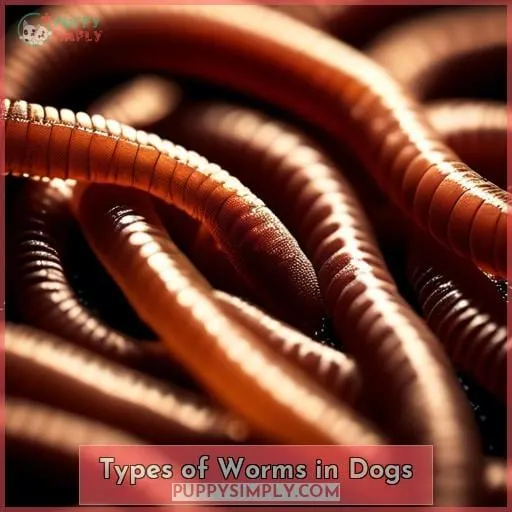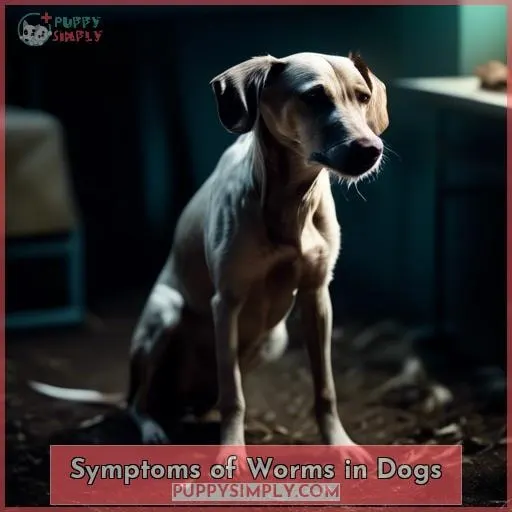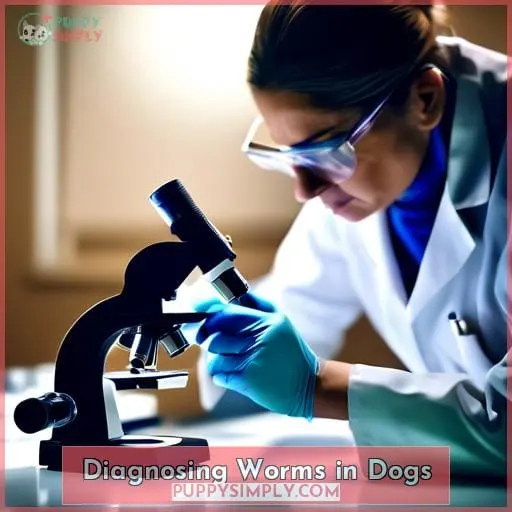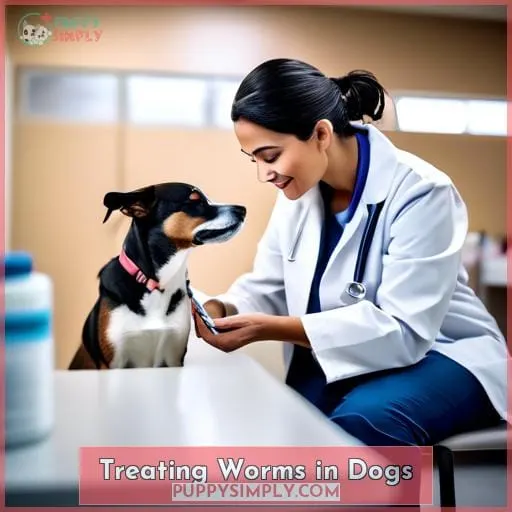This site is supported by our readers. We may earn a commission, at no cost to you, if you purchase through links.
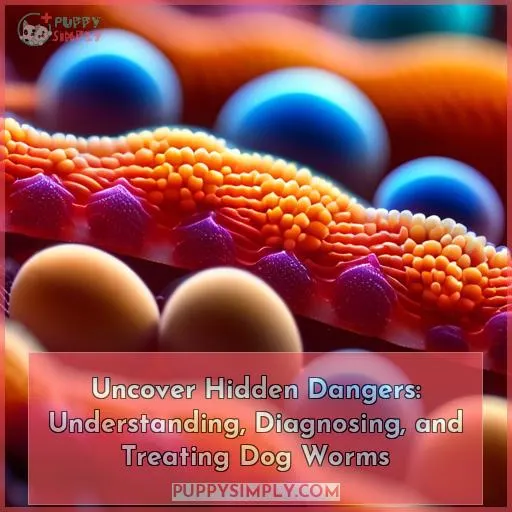 Uncover the hidden dangers lurking within your furry companion’s system.
Uncover the hidden dangers lurking within your furry companion’s system.
Dog worms, insidious parasites, can wreak havoc on your pet’s health, causing discomfort, illness, and even life-threatening complications.
Embark on a journey of understanding, diagnosis, and treatment, empowering yourself with the knowledge to safeguard your dog’s well-being.
Diagnosis:
- Recognize the signs and symptoms of worm infestation, such as weight loss, diarrhea, vomiting, and a dull coat.
-
Utilize fecal exams and blood tests to confirm the presence and type of worms.
Treatment:
- Administer deworming medication prescribed by your veterinarian.
- Follow the recommended dosage and treatment schedule to ensure effectiveness.
-
Practice good hygiene to prevent re-infestation, including regular handwashing and cleaning of the dog’s living area.
Prevention:
- Keep your dog’s environment clean and free of potential sources of worm infestation, such as feces and contaminated soil.
- Control access to areas where your dog may encounter wild animals, which can carry worms.
- Administer regular deworming treatments as recommended by your veterinarian.
Table Of Contents
- Key Takeaways
- Types of Worms in Dogs
- How Dogs Get Worms
- Symptoms of Worms in Dogs
- Diagnosing Worms in Dogs
- Treating Worms in Dogs
- Preventing Worms in Dogs
- What Are the Costs of Treating Worms in Dogs?
- Can Worms in Dogs Be Transmitted to Humans?
- Frequently Asked Questions (FAQs)
- What are the potential long-term health effects of untreated worm infections in dogs?
- Are there any natural or home remedies for treating worms in dogs, or is medication always necessary?
- How can I tell if my dog has worms if they are not showing any symptoms?
- Are there any breeds of dogs that are more susceptible to worm infections than others?
- What are the potential risks and side effects of deworming medication for dogs?
- Conclusion
Key Takeaways
- Dogs can get various types of worms, including roundworms, hookworms, tapeworms, whipworms, and heartworms.
- Dogs can get worms through environmental transmission, transplacental and milk transmission, or direct contact with infected animals.
- Symptoms of worms in dogs can include diarrhea, vomiting, a swollen abdomen, unexplained weight loss, and a pot belly.
- Deworming medication, prescribed by a veterinarian, is the most common treatment for worms in dogs.
Types of Worms in Dogs
You’ll encounter a variety of worms in dogs, each with its unique characteristics and transmission methods.
Roundworms, scientifically known as Toxocara canis and Toxascaris leonina, are intestinal parasites commonly found in puppies and adult dogs. They’re transmitted through the ingestion of contaminated soil or feces, leading to symptoms like vomiting, diarrhea, and weight loss.
Hookworms, blood-sucking parasites with teeth, reside in the small intestine. They can be contracted through ingestion of contaminated soil or by direct skin penetration.
Tapeworms, long, flat parasites, inhabit the small intestine. They’re transmitted through the ingestion of infected fleas or by eating an infected animal. Tapeworms can cause weight loss, diarrhea, and segments of the worm may be visible in the dog’s stool.
Whipworms, residing in the large intestine, don’t extract many nutrients from the host. They’re transmitted through the ingestion of contaminated soil or feces. Whipworms can cause diarrhea, weight loss, and anemia.
Heartworms, transmitted by mosquito bites, reside in the heart and blood vessels. They can cause coughing, difficulty breathing, and heart failure if left untreated.
Understanding these types of worms is crucial for effective diagnosis and treatment. Regular deworming and preventive measures can safeguard your dog’s health, ensuring a happy and healthy life.
How Dogs Get Worms
Your dog’s exposure to contaminated environments and contact with infected animals can lead to worm infestations. Understanding the worm life cycle and transmission modes is crucial for prevention and control.
Environmental Transmission:
- Mother to Puppies: Roundworms and hookworms can be passed from an infected mother to her puppies before birth or through her milk.
Understanding these transmission routes helps you take proactive steps to prevent worm infestations and safeguard your dog’s health. Regular deworming, parasite control, and maintaining a clean environment are essential components of responsible dog ownership.
Symptoms of Worms in Dogs
Now, you’ll learn about symptoms of worms in dogs.
Common signs include:
- Diarrhea
- Vomiting
- A swollen abdomen
These symptoms can indicate the presence of intestinal worms, which can cause health issues if left untreated.
Common Symptoms
Now that you’re aware of how dogs contract worms, let’s delve into the common symptoms to watch out for.
Intestinal worms can manifest in various ways.
Be vigilant for:
- Unexplained weight loss
- A pot belly
- A dull coat
- Skin irritation
- Persistent coughing
Monitor your dog’s stool for signs of intestinal worms or consult your veterinarian for a definitive diagnosis.
Early detection and treatment are crucial for your dog’s well-being.
Diagnostic Tests
Recognizing signs of worms in your dog requires a thorough examination of:
- Stool
- Blood
- X-rays
- Ultrasound results
Fecal flotation separates worm eggs from stool.
Blood analysis reveals anemia or an elevated white blood cell count, signs of worm infestation.
X-ray imaging and ultrasound examination visualize worms or worm-related abnormalities in your dog’s digestive tract.
These diagnostic tests empower veterinarians to accurately identify worm types and recommend effective deworming treatments.
Deworming Frequency
With an understanding of common symptoms and appropriate diagnostic tests, you can determine the frequency of deworming needed to keep your dog worm-free.
Puppies require more frequent deworming than adult dogs, typically every two weeks until 12 weeks of age and then monthly until six months.
Adult dogs should be dewormed every three to six months, depending on their lifestyle and risk factors.
Consult your veterinarian to establish a personalized deworming schedule for your dog.
Diagnosing Worms in Dogs
You can diagnose worms in your dog through microscopic examination of their feces to detect eggs.
This simple yet effective test offers a direct look into your dog’s intestinal ecosystem, revealing the presence of unwelcome guests like roundworms, hookworms, whipworms, and tapeworms.
Fecal examination:
This cornerstone of worm diagnosis involves collecting a fresh stool sample and subjecting it to microscopic scrutiny.
Trained technicians meticulously search for worm eggs, which vary in shape and size depending on the parasite species.
A positive result confirms the presence of worms, guiding your veterinarian toward the appropriate treatment.
Beyond fecal exams:
While fecal examination stands as the primary diagnostic tool, your veterinarian may employ additional tests to gain a comprehensive picture of your dog’s condition.
Blood tests can reveal anemia, a common consequence of hookworm infestation.
X-rays and ultrasound can uncover intestinal blockages caused by severe worm infestations.
Preventing transmission:
Early diagnosis and prompt treatment are crucial not only for your dog’s health but also for safeguarding your family.
Worms can transmit to humans, particularly children, through contact with contaminated soil, sand, or objects.
Regular deworming, meticulous hygiene practices, and restricting your dog from roaming in potentially contaminated areas are essential preventive measures.
Treating Worms in Dogs
To effectively eliminate worms in your dog’s system and prevent future infestations, you’ll need to administer deworming medication.
Your veterinarian will recommend the most appropriate medication based on the type of worm your dog has.
Medications for worms typically come in oral or topical form and are administered according to the veterinarian’s instructions.
Deworming Regimen
| Deworming Schedule | Medication | Side Effects |
|---|---|---|
| Puppies | Every 2 weeks until 12 weeks of age, then every month until 6 months of age | Vomiting, diarrhea, loss of appetite |
| Adult Dogs | Every 3-6 months | Vomiting, diarrhea, loss of appetite |
| Pregnant Dogs | Every 2 weeks during pregnancy and 2 weeks after whelping | Vomiting, diarrhea, loss of appetite |
Additional Considerations
- Deworming after treatment may be necessary to ensure all worms have been eliminated.
- Some dewormers can have side effects, such as vomiting, diarrhea, and loss of appetite.
- The cost of deworming varies depending on the type of medication and the size of your dog.
- Talk to your veterinarian about worming your dog during pregnancy to prevent transmission of worms to the puppies.
By following a regular deworming schedule and taking steps to prevent worm infestations, you can help keep your dog healthy and worm-free.
Preventing Worms in Dogs
How can you prevent your dog from getting worms in the first place?
Proactively safeguarding your canine companion against worm infestations requires a multifaceted approach, encompassing preventive measures, environmental control, and responsible pet ownership.
Commence with a strategic deworming regimen, adhering to a veterinarian-recommended schedule. Puppies, particularly vulnerable to worm infections, necessitate more frequent deworming initially, gradually transitioning to a maintenance schedule as they mature.
Environmental contamination poses a significant risk factor for worm acquisition. Regularly remove and dispose of dog feces from your yard, effectively interrupting the life cycle of worms and preventing reinfection.
When venturing outdoors, keep your dog on a leash to minimize contact with potentially contaminated areas.
Indoor dogs aren’t immune to worm infestations. Fleas, capable of transmitting tapeworms, can thrive indoors. Implement a comprehensive flea prevention program, utilizing appropriate products and consulting your veterinarian for guidance.
Educating yourself about dog worms, their transmission, and prevention strategies empowers you to protect your pet effectively. Share your knowledge with friends, family, and fellow pet owners, fostering a community-wide awareness of worm prevention.
Regular hand washing after handling your dog, particularly after outdoor activities, further minimizes the risk of worm transmission.
What Are the Costs of Treating Worms in Dogs?
The cost of treating worms in dogs can vary widely depending on several factors, including:
- The type of worm
- The severity of the infestation
- The size of the dog
- The geographic location
- Deworming Medication:
- The cost of deworming medication can range from $10 to $50 per dose, depending on the type of medication and the size of the dog.
- Treatment:
- The cost of treatment for worms in dogs can vary depending on the severity of the infestation and the type of worm.
- In general, treatment can cost anywhere from $50 to $500.
- Prevention Methods:
- Prevention is key when it comes to dog worms.
- Regular deworming and the use of preventive medications can help keep your dog free from worms.
- The cost of prevention can range from $50 to $100 per year.
- Home Remedies:
- There are some home remedies that can help treat worms in dogs, but it’s important to note that these remedies shouldn’t be used as a substitute for veterinary care.
- The cost of home remedies can vary depending on the ingredients used.
In addition to the direct costs of treating worms in dogs, there are also indirect costs to consider, such as:
- The cost of lost productivity if you have to take time off work to care for your dog
- The cost of replacing damaged furniture or carpets
- The cost of emotional distress
Pet insurance can help cover some of the costs of treating worms in dogs, but it’s important to compare policies and choose one that meets your needs.
Can Worms in Dogs Be Transmitted to Humans?
The presence of worms in dogs isn’t just a canine concern; it poses a significant public health risk due to the potential for zoonotic transmission, meaning these parasites can jump species and infect humans.
Roundworms, hookworms, and tapeworms are the usual culprits in this unwelcome exchange.
Children are particularly vulnerable to worm infections acquired from dogs. Their inquisitive nature and tendency to play in areas contaminated with animal feces make them susceptible to accidental ingestion of worm eggs or larvae.
As these parasites make their way into the human body, they can cause a range of health issues, from mild intestinal discomfort to more severe conditions like nerve damage and blindness.
Preventing worm transmission from dogs to humans is a shared responsibility. Pet owners must deworm their dogs regularly, following a veterinarian’s recommended schedule.
Additionally, maintaining proper hygiene is paramount. Always wash your hands thoroughly after handling your dog, playing outdoors, or gardening.
When handling pet waste, wear gloves and dispose of it properly in a sealed bag. Children should be discouraged from playing in areas where dogs have defecated.
If you suspect your dog has worms or if you’ve noticed any unusual symptoms in yourself or your family members, consult your healthcare provider or veterinarian immediately.
Frequently Asked Questions (FAQs)
What are the potential long-term health effects of untreated worm infections in dogs?
Untreated worm infections can lead to malnutrition, stunted growth, and impaired cognitive development in dogs.
Severe infestations can cause intestinal blockage, anemia, and even death.
Are there any natural or home remedies for treating worms in dogs, or is medication always necessary?
There is no evidence that a natural, homegrown, or ultimately safe and effective method of healing can be used for the treatment of a dog that has a parasitical, bacterial, viral, fungal, or any other type of bug.
How can I tell if my dog has worms if they are not showing any symptoms?
Regular fecal examinations can detect worm eggs or larvae, even in asymptomatic dogs.
This provides early detection and enables prompt treatment to safeguard your dog’s health.
Are there any breeds of dogs that are more susceptible to worm infections than others?
Variations in susceptibility to worm infections among dog breeds exist due to genetic and immunological factors.
Research suggests that certain breeds may have a higher predisposition to specific worm types.
Breed-specific deworming protocols tailored to these variations can enhance preventive care strategies.
What are the potential risks and side effects of deworming medication for dogs?
Deworming medications, while effective, can carry potential risks and side effects for dogs.
These may include:
- Gastrointestinal disturbances, such as vomiting or diarrhea.
- Allergic reactions.
- Neurotoxicity in certain cases.
Careful selection of medication and adherence to recommended dosage and frequency are crucial to minimize these risks.
Conclusion
Unveiling the insidious threat of dog worms is a crucial step in safeguarding your beloved companion’s health.
Through diligent diagnosis, effective treatment, and proactive prevention, you can shield your furry friend from the detrimental effects of these parasites, ensuring a life of vitality and well-being.

